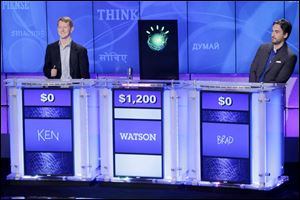
Man vs. Machine
Watson takes on former 'Jeopardy!' champions
2/8/2011PASADENA, Calif. -- Two of Jeopardy's biggest brainiacs -- Ken Jennings and Brad Rutter -- will compete in a three-day event Monday through next Wednesday for a chance to win $1 million.
Having past winners compete is nothing new. It's the third contestant that makes this showdown different.
They will play Watson, a super computer. That might not sound like a fair fight until you realize Jeopardy requires more than just knowledge. Often the answers are provided in the form of puns and other word games.
Watson's programmed to understand the word play of human language. How Watson -- named for IBM co-founder Thomas J. Watson -- got to be so smart is the focus of the NOVA episode Smartest Machine on Earth: Can a Computer Win on Jeopardy!? airing at 10 p.m. Wednesday.

IBM’s Watson computer system competes against Jeopardy’s two most successful contestants, Ken Jennings and Brad Rutter.
But Watson's the star.
It's the computer's internal architecture, says David Ferrucci, head of the IBM team behind Watson, that makes it able to be on the game show.
"It's looking at so many different algorithms, thousands of different algorithms, some of them focused on understanding the question, weighting the various terms, looking at the grammar, the syntax, finding the phrases, the keywords, the entities, the dates, the times, trying to understand what exactly is it even asking for," Ferrucci says.
"But ultimately, what's exciting about it is how it looks at many, many different possibilities and assesses them and builds a confidence in a final answer to decide whether or not it's correct and whether or not it wants to risk buzzing in on Jeopardy!"
Watson calls on -- like a human -- stored information. It'll hear the question, formulate an appropriate response and then answer in a life-like voice.
It's taken years to get Watson ready, including some practice games. In the beginning, Watson came up with some silly answers, such as to a question about what grasshoppers eat. Watson's answer was "kosher."
There are two other skills needed to play Jeopardy!: speed in hitting the buzzer and wagering skills. Watson's quick on the buzzer and has been programmed on how much to wager based on opponents' totals and familiarity with the Jeopardy! category.
As for the prize money, if Jennings or Rutter win, they get half and the rest goes to charity. If Watson wins, all of the money goes to charity. (Watson did edge out Jennings and Rutter in a short Jan. 13 practice round ahead of this month's tournament.)
Dr. Rodney Brooks, the Founder and Chief Technology Officer of Heartland Robotics and recently retired professor of robotics at MIT, says no one should panic if Watson wins. Computers aren't going to make humans obsolete.
"One of the things people worry about is, as the computer gets smarter, are they going to replace us?" Brooks says. "Well, you guys are still here. You're all sitting with computers in front of you. They didn't replace you. You use them as tools. And this is getting better tools."